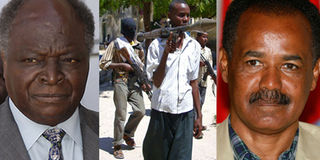Kibaki backs action on Eritrea terror link

President Isaias Afwerki's Eritrean state has been accused of sponsoring Al Shabaab, a Somali militant group associated with the Al Qaeda terror network. Kibaki’s sentiments underline concern about the threat posed to Kenya’s security by Al Shabaab.
President Kibaki has asked the Inter-Governmental Authority on Development to act on the security threat posed by Eritrea in the region.
Speaking at an Igad meeting in Addis Ababa, Ethiopia on Monday, the President said the group’s Executive Council had drawn attention to the growing destabilisation activities in the region associated with Eritrea.
The Executive Council has censured Eritrea for engaging in subversive activities against its neighbours.
“This is a matter of serious concern and it is my hope that this Summit will focus some attention on it in view of the need for collective security and sustainable peace,” President Kibaki said.
He added: “It is in the interest of all our countries that these issues are adequately dealt with at this summit.”
Eritrea has been accused of sponsoring Al Shabaab, a Somali militant group associated with the Al Qaeda terror network.
Mr Kibaki’s sentiments underline concern about the threat posed to Kenya’s security by Al Shabaab.
The concerns are shared by powers such as the US that are helping Kenyan security forces upgrade their capacity.
International terrorism
As part of the upgrade, Kenya is to train a new force to protect its borders and guard against international terrorism with US government aid.
The US Government is to provide $14.1 million (Sh1.26 billion), allocated to Kenya in its budget proposals for next year, mainly for boosting border operations.
The documents on the State department’s website show the defence upgrade would shield Kenya in case of an “exploding Sudan and imploding Somalia”.
The money is in addition to the Defence ministry allocation in this year’s Budget.
It involves sending local troops to the US for specialised training and installing computerised systems at the borders to help immigration officials to identify terrorists attempting to enter or leave Kenya, the State Department documents show.
“Land border security initiative in Kenya, in partnership with the US Border Patrol, to train and equip a new rural Kenyan Border Patrol Agency to secure vulnerable remote border regions from illegal crossings,” part of the report reads.
South Sudan, in particular, is seen as a fragile nation as it acquires its independence, while Somalia is considered the seat of the Al Qaeda terror network in the region.
The report cites Kenya’s well-developed air travel that makes it “a major operational theatre or transit haven for terrorist groups or individuals” comparing it with such notorious ones as Iraq, Pakistan, Afghanistan, Yemen and Thailand.
Sh198 million ($2.2 million) is to finance Kenya’s defence forces’ operations with additional $1 million (Sh90 million) being used to train local troops.
Another $8.9 million (Sh801 million) is to be shared out between “anti-terrorism, non-proliferation and demining programs,” according to the proposals.
Once installed at the border, the new monitors would use biometric data to identify suspects with high accuracy.
Biometrics consists of methods for uniquely recognising people based on various factors such as palm print, DNA, face or iris recognition.
Another part of the allocation — $2 million (Sh180 million) — is to strengthen Kenya’s capacity to fight drugs and narcotics trafficking and abuse.
Already, plans are under way through the US Drug Enforcement Agency (DEA) to establish a permanent office in Kenya.
DEA’s presence in the country is intended to limit drugs-driven corruption, which in the view of the US, is prevalent in Kenya’s “law enforcement, Judiciary and political institutions.”
It comes at a time when US President Barack Obama has named two Kenyans, Kilome MP John Harun Mwau and Ms Naima Mohamed Nyakiniywa, as drug lords.
Under US Kingpin Act, being named as a key player in trafficking narcotics, means that the named person is prohibited from doing business or moving money through the US.
DEA activities in Kenya were under the office in Pretoria, South Africa previously. The initiative to fight trade in narcotics received no funding in the previous year.
DEA agents are expected to help authorities fight the international drugs trade and bring traffickers to justice, regardless of their political clout.
Other countries to benefit next year include Ethiopia, Nigeria, Senegal, Sudan and South Africa.
US secretary of State Hillary Clinton, who made the budget proposals, also seeks to have Kenya’s regional anti-terrorism training centre expanded.
Training local prosecutors and developing joint law enforcement and prosecutorial task forces is also planned.




